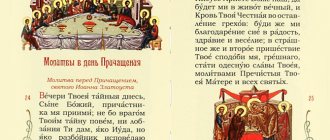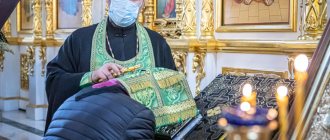Communion is a church sacrament, the acceptance of the Blood and Flesh of Christ
Briefly about the most basic things. Communion is one of the church sacraments. It reproduces the events of the Last Supper, when the Savior treated the apostles with wine and bread.
Read also: What to wear with high top sneakers
The purpose of Communion is to let a person into the Church of Christ, to make him a part of it through bread and wine.
Bread and cups needed for the Sacrament of Communion
But we don’t go to Communion every day, right? The nuances of this ritual remain a question for many. Let’s look at what you can and cannot do and pay special attention to the following 5 myths about what happens after Communion:
- You can't have intimate relationships.
- You can't brush your teeth.
- You can't wash yourself.
- You can't cut your hair.
- You cannot transfer things to other people.
But first, let's talk a little more about the procedure itself.
When did the ritual appear?
There is little information in history about how everything happened in those distant times. But it is known that the ritual of communion was approved precisely by Jesus Christ during the celebration of the Jewish holiday - Passover, before His imminent crucifixion.
At the Last Supper, Jesus explained to his disciples the new meaning of traditional, familiar dishes. Taking the bread prepared for the celebration, He blessed it and called it His Body, and invited them to taste the wine, calling it His Blood.
Here Christ’s desire for the regular celebration of the Sacrament of Communion is expressed.
Who is allowed to take communion?
Christian commandments are a gift from the church to all people, and not a heavy burden. Thanks to them, they become humble and patient. In the Church, priests are called to distribute this gift of the Divine Liturgy to all Christians who would like to get closer to this grace, which has a strong effect on soul and body.
But there are cases when a clergyman can, and sometimes is obliged to, impose penance, and under special conditions, excommunicate him from communion for a long time, which is done for the sake of a person’s spiritual rebirth.
The main reason for excommunication is grave sin (fornication, murder, theft, witchcraft, renunciation of Christ, outright heresy). Previously, people lived in communities and excommunication for particularly serious sins could last up to twenty years. But people who sinned came to church together with everyone else and prayed all these years for forgiveness.
In the modern world, when everyone is divided, this would mean leaving a person completely without God. Nowadays, a repentant person can be excommunicated from communion for several months, having to read prayers. This is done so that the devil cannot lead the repentant away from the faith. After all, the priest does not punish, but helps prepare for the secret rite. By making incredible efforts to change for the better, a person receives worthy communion.
Parishioners whose moral state is simply incompatible with this ritual are deprived of communion - these are people in a civil marriage, which is considered fornication, as well as those who harbor a grudge and do not want to forgive a repentant person.
They may not admit a person who was not present at the evening service, since the liturgical day begins in the evening, or those who were poorly prepared for communion, or for some other reason.
How to behave after the ceremony
The rite of communion is performed during the celebration of the Divine Liturgy by the clergyman. Having received the prosphora, you need to stay in the church until the end of the church service. Communion is the moment of unity with the Savior, it is the entry of Christ into the soul and body of the believer.
A Christian who has received communion is allowed to communicate with God. A believer can ask God for forgiveness for his sins and express his gratitude to God. After the ritual, you need to mentally communicate with the Savior, ask him for admonition and guidance on the true path. At the end of the liturgy, it is recommended to read the prayers of thanksgiving after communion from the prayer book.
What can and cannot be done on the day of communion?
How many amazingly strange superstitions have been created around the great Sacrament of Communion! According to many Orthodox Christians, after communion you cannot:
- sleep;
- eat everything that contains bones, pits, shells (fish, poultry, fruits, seeds, nuts, etc.);
- kiss someone (even a child);
- spit;
- swear;
- sing.
The list can be supplemented, but this is not necessary, because we turned to the priest for advice and asked him to clarify what is permissible on the day of communion and what is absolutely not. Archpriest Nikolai Nikolenko, rector of the Panteleimon Church in the city of Zheleznoye (Artyomovo), brought clarity to the question.
After communion, you can do everything that is useful for the salvation of the soul. It is advisable to spend this day with the realization that you have accepted Christ Himself into yourself, and try not to quarrel, not to judge, not to use foul language. You can help your neighbor by doing everyday housework.
You cannot spend the day in idleness - near the TV or computer, in unnecessary amusements. In general, the Lord does not forbid us anything, but we must remember that “everything is permissible for me, but not everything is profitable” (1 Cor. 6:12).
Now about the myths. Sometimes some of them distort Orthodoxy, turning it into a kind of paganism.
For example, the myth that you cannot spit on the ground on the day of communion is rooted in the cult of the deification of the earth as creative energy.
Regarding the bones: tell me, did they become sanctified after being in your mouth? Has grace passed on to them? All this, of course, has no canonical or even edifying basis.
The tradition of not sleeping on the day of communion actually exists in some monasteries. Why did it arise? For monks, life is scheduled according to obediences; as a rule, they simply have no time, however, in the Athonite Rule, for example, there is a daytime period for rest. The tradition of not sleeping is explained this way: so that Satan does not tempt you in your sleep.
If a person is afraid of this, let him not sleep. If a miner, after taking communion, does not sleep before his shift, he will collapse. The same applies to mothers with many children and nursing mothers, who are happy to lay their heads at least for a little while while the baby falls asleep. I think there will be no sin in such a daytime rest, because the reason for this sleep is not laziness, but fatigue.
You need to approach this issue based on your own well-being.
I heard that you can’t kiss icons or the priest’s hand after communion. Why? Have your lips become more holy than icons? Or are you afraid of wasting the grace you received at communion? The same applies to any kisses, when some overly pious parishioners do not even kiss children after communion.
By the way, I recently heard another “news”: you can’t kiss during a post, even when meeting a loved one. It turned out that only on Easter can one begin to make Christ, and before that - under no circumstances. Meanwhile, I note that in the sacrament of wedding there is a moment when the spouses kiss. We don’t cultivate this, but it is in the breviary.
This kissing occurs after the man and woman have received communion.
You cannot spend the day of communion in idleness, but this does not mean that you need to work until exhaustion. You can relax and take a nap.
If a communicant reads the Psalter, the lives of the saints, or one of the million wonderful books of spiritual content, it will be wonderful.
Now, if a person looks away from the TV and picks up a book—even if not an Orthodox book, but an ordinary literary classic—this is already a big deal. Dostoevsky, Chekhov - why not re-read these writers?
If you go to visit a lonely grandmother, just talk to her - how wonderful it will be! Helping your neighbor is not just about chopping wood for him or unloading a truck of coal. Our elderly suffer from loneliness.
They are forgotten by their relatives, the state, and colleagues. If someone comes to them with a jar of jam or some kind of bagel, they talk and drink tea together, it will be a wonderful day for everyone.
Such a pastime, of course, will not be considered idle.
If a person has children, and he takes care of them, checks their lessons, reads books with them, writes with them - this is also not idleness. But if you left your people and went to visit someone, you need to be careful here.
Is this visit really more important than everything you leave at home? My father, a priest, told how one woman complained to him: “Father, my husband beats me!” - “Why is he beating? - “Yes, for now I’ll read the kathisma, then three akathists, then I’ll make a hundred bows... And he comes home from work, wants to eat and distracts me from prayer!”
The main thing you need to understand is that prayer and the sacraments should not be the cause of discord in the family. Communion should sanctify and enliven a person. Let's remember this.
Recorded by Ekaterina Shcherbakova
https:///chto-mozhno-i-chego-nelzya-delat-v-den-pr…
The desire to go to the temple is associated with the search for answers to questions
Often people of various qualities, professions, ages, levels of life and wealth have an irresistible desire to be in church.
Although, until now they may not have visited temples or been there very abruptly. For many, such sensations are new. Then they wonder why they are drawn to church.
There is no exact answer to this question. If only because each person is individual and everyone has a desire for their own reason.
But if you combine all the stories that accompany the question of why you are drawn to church, you will notice one similarity. Each of these people is in search of something important and fundamental.
Someone was prompted to this search by a shock in life, a tragedy, the loss of a loved one. Someone spent their whole life thinking about the main thing, but did not turn to the church. Some people feel loneliness and believe that they will find unity in the Orthodox Church.
Someone suddenly realized that until now he had been doing everything wrong, but he didn’t know how differently. For some, church is the only place where they feel safe and in harmony with themselves.
Church is a place where you can feel unity with yourself
There is no clear answer. But there is an explanation and proof that the church unites those who are in search, who are moving along the path of spiritual enlightenment and want to find answers to questions.
How to behave in the morning before the Sacrament of the Eucharist?
On the day of Communion, you should not just “subtract” the morning rule and “finish reading” the sequence. First of all, it is worth praying carefully so that the Lord will vouchsafe us to receive communion. We are all unworthy of the Body and Blood of the Savior, so we must gratefully accept this life-giving gift.
Should I brush my teeth?
The question is often asked: is it possible to brush your teeth in the morning? Some “orthodox” believe that it is impossible. But many priests answer: it is possible. Why?
If it is unpleasant for a person to go to work or communicate with people because of the unpleasant smell from his breath, then how can he approach the Chalice in this form and with such a feeling? We must come to Christ with a pure heart and clean lips. In all senses.
Communion and taking medications
Another problematic question: how to take communion if you have to take pills in the morning?
Bishop Mark Golovkov says that the pills are not food, but medicine. If you have serious health problems and it is dangerous for you to interrupt the course of some drug, then you should not refuse both the pills and Holy Communion.
If you take some vitamins or nutritional supplements, and nothing serious will happen when you take them not in the morning, but in the afternoon, then why panic? You can calmly take communion, and when you get home, take vitamins or medications.
If everything is more or less clear with behavior before Communion, then many questions remain with what is possible and not possible after receiving the Holy Gifts.
What not to do after communion
A Christian who has received forgiveness and holy communion should not commit evil deeds. It is forbidden to even use foul language or think bad thoughts towards others. After communion, you should not eat fatty foods, drink alcohol, or smoke. The day of unity with Christ should become a new stage in the life of a Christian, deliverance from harmful habits and sinful thoughts.
It is forbidden to have intimacy immediately after the ceremony, but you can sleep during the day (if the person is very tired). After communion, you need to mentally talk with God, pray and do good deeds for the Savior.
It is forbidden to spend the day in idleness, sit near the TV or computer, or have fun in a restaurant or nightclub.
What should you abstain from?
What should you not do after communion, so as not to harm your soul or bring trouble upon yourself? The Orthodox Church advises maintaining bodily purity and occupying your thoughts with prayers.
Coming from church, we should not sleep, because we need to preserve the grace we have received. We must stay awake, read the Holy Books, occupy our thoughts with thoughts about God, because this is the most fertile time for our minds to perceive the mysteries of the Lord. This way, the feeling of spiritual celebration will remain in us for a longer period.
On this day you cannot have noisy entertainment or enter into intimate marital relationships. We must refrain from anger, malice, and quarrels, and spend time and energy on studying the Gospel.
Why does a streak of bad luck begin after communion?
Is this a bad omen or what?
Hello Julia! With all due respect to you, we must state that you are far from Christianity. The Christian Church is the Most Pure Body and Blood of our God Jesus Christ! There is no higher and more terrible shrine in the entire universe than the Body and Blood of Christ! In order to partake of the Holy Mysteries of Christ, we Christians cleanse our body with many days of strict fasting, then cleanse our souls with repentance in the sacrament of confession, be sure to attend the evening service the day before, read special canons and akathists, and only then, having arrived on an empty stomach, we receive communion at the Divine Liturgy! If we do not prepare so carefully, then unworthy communion will lead to condemnation for us, for some it will lead to illness, and for some even to death, according to the Apostle Paul. You, out of ignorance, did not prepare in this way, and did not prepare your child, and thus exposed him to mortal danger by sending him to communion without reverence. Perhaps the child did not even know that he had to take inside the Body and Blood of God Himself. Therefore, the Lord, in His mercy, corrected your mistake and did not allow the child to receive communion to his condemnation, and the communion came out of him. The most terrible Shrine in the universe was desecrated by vomiting along with food onto the ground. There is no sin on the child for this. But you must urgently go to confession, and with tears ask God that you allowed such a blasphemously irresponsible attitude towards the Sacrament of Communion. The sin of spewing communion from a child also lies with the priest from whose hands the child received communion. He may face a ban from further ministry. The place where the communion, which had not had time to digest, fell should be burned with coal, then thoroughly washed, and everything that touched the communion should be burned in a special church oven. Do you understand how serious the blasphemy against the shrine was? We hope that the question about the omen is a joke? The Orthodox have no signs. We believe in God and our King, Savior Jesus Christ. We wish you to realize that you cannot joke with God in this way, and to prepare both the child and yourself for communion with all responsibility. God bless you!
[ad01]
During Communion, you can skip wine and drink grape juice, but this is not encouraged
One of the most painful topics for the Church is the reluctance of many people to drink wine, which symbolizes the Blood of Christ. This happens for two reasons:
- The doubt is that it is wine that is needed. On Easter night in Jerusalem there should have been nothing leavened on the table, so it is unlikely that Christ used a drink with yeast and alcohol. He himself says: “I will drink of this fruit of the vine,” and not “I will drink wine.” Many are convinced that the Savior drank grape juice. There are 15 different words translated simply as “wine” in the Bible.
- Stop drinking alcohol. There may be both ideological and medical reasons. Let's say a person has a disease, an ulcer. Does he really have to drink alcohol? Surely God will not give communion with something else?
Often one reason is layered on top of another. In fact, God doesn't care what level of fermentation is in the drink. The Bible makes no recommendations. During the years of persecution, priests received communion with water in prisons, and that was okay.
Another thing is that it is not easy to find a parish where the priest agrees to abandon tradition and meet halfway. But there are no theological obstacles to this.
Mosaic of Jesus making First Communion - giving his Blood to the apostles










